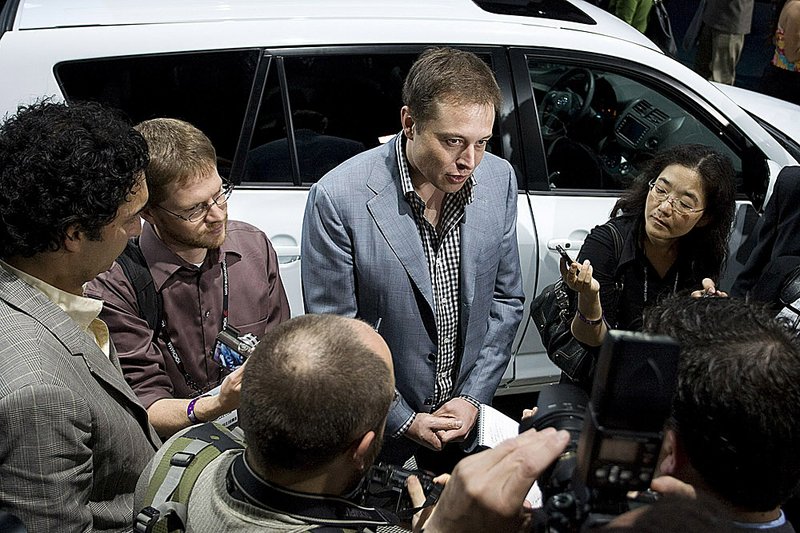LITTLE ROCK — Toyota, Daimler and BMW are turning to laptops for a cheaper way to power their electric cars - and their sales.
Automakers are testing packs of lithium-ion batteries assembled by Silicon Valley startup Tesla Motor Inc. costing less than bigger, car-only batteries favored by General Motors, Nissan and Mitsubishi. A pack of 6,831 cylinder-shaped cells made by Panasonic Corp. powers Tesla’s $109,000 Roadster sports car for up to 245 miles per charge.
The car industry will help lithium-ion battery makers more than triple sales to $60 billion in a decade compared with the year ended in March, according to Sanyo Electric Co., the world’s biggest maker of the batteries.
Rechargeable consumer electronics batteries benefit from an economy of scale that may help cut manufacturing costs and sticker prices in the nascent electric-car industry, said Koji Endo, a Tokyo-based analyst at Advanced Research Japan.
“It may lead to the total component cost of an electric car getting lower than that of a gasoline car,” Endo said. “As the cost lowers, there’ll be more likelihood that retail prices of electric cars will drop.”
Electric-vehicle prices are higher than most autos, with GM’s Chevrolet Volt selling for $41,000 and Nissan’s Leaf for $32,780 before tax credits. Electric vehicles cost about twice as much to produce than gasoline-engine cars because the batteries are so expensive, according to consultant Frost & Sullivan Inc.
Sales of electric cars and hybrids, including plug-in models, will reach about 954,000 worldwide this year, or about 2.2 percent of all car sales, J.D. Power and Associates, an industry forecaster in Westlake Village, Calif., estimated in October.
Government subsidies may help boost sales of plug in hybrids and electric vehicles to 9 percent of auto sales in 2020, Bloomberg New Energy Finance estimated last month.
Panasonic, the majority shareholder in Sanyo, is the main supplier of lithium-ion cells to Tesla and last month bought a $30 million stake in the Palo Alto, Calif., company. Toyota and Daimler, which makes Mercedes-Benz vehicles, also own Tesla stakes.
Panasonic boosted its annual production capacity for the small batteries by 9 percent to 1.4 billion units after opening a plant in Osaka, Japan. The company wants to increase sales of energy related products because of tougher competition in its television-making business.
Packs assembled by Tesla power Daimler’s electric Smart cars, and Toyota will use Tesla’s small-cell packs in an electric RAV4 small SUV in 2012. BMW has leased 450 Mini Coopers powered by laptop cells.
The larger lithium batteries cost about $700-$800 per kilowatt-hour to produce, while mass-produced packs using small laptop cells may cost $200, said Martin Eberhard, Tesla’s founder and former chief executive officer.
“It’s a much more effective approach,” he said. “There’s a huge advantage in terms of economy of scale.”
Factories making small cells are running at high capacity, Eberhard said. That also benefits electric-vehicle makers who don’t have the resources to develop their own batteries, said Menahem Anderman, president of Advanced Automotive Batteries, a consulting firm in Oregon House, Calif.
GM partners with South Korea’s LG Chem Ltd. for the Volt battery pack, and Nissan partners with NEC Corp., Japan’s biggest personal-com-puter maker, for the Leaf. Both cars are going on sale in the U.S. this month.
Toyota, the world’s largest automaker, is working with Tesla on the electric RAV4, while its plug-in Prius hybrid and a small, electric car planned for 2012 employ larger batteries.
“When the customer decides ‘This is the car I want,’ we want to be that full-line maker who has the answer for that customer,” Toyota President Akio Toyoda said. “By using both car batteries and laptop batteries, we are able to provide customers with a wider variety of choice.”
The alliances with Toyota and Daimler helped Tesla generate an initial public offering in June that raised about $226 million.
A123 Systems Inc., a Watertown, Mass.-based lithium-ion battery maker part-owned by General Electric Co., also is promoting small, cylindrical cells originally designed for power tools.
Lithium-ion batteries in consumer electronics have a history of recalls because of overheating that can cause a fire. Panasonic now uses an insulator film between electrodes to limit the risk of overheating, said Yuji Tsuzaki, a spokesman for company’s battery unit.
Information for this article was contributed by Makiko Kitamura, Maki Shiraki, Yuki Hagiwara and Masatsugu Horie of Bloomberg News.
Business, Pages 21 on 12/13/2010
